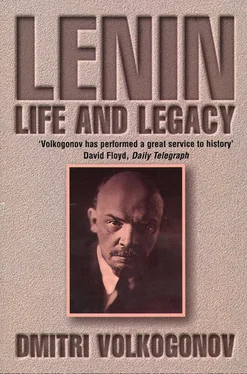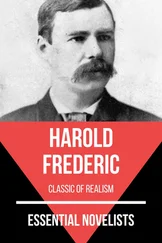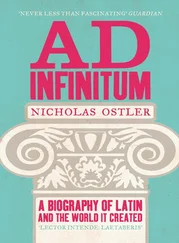The twelve-volume ‘Biographical Chronicle’ of Lenin’s life, while it attempts (with little success) to catalogue every fact and account for virtually every waking moment of his life, is extremely laconic about his birth and background: ‘April 10 (22 New Style 4 ) 1870 Vladimir Ilyich Ulyanov (Lenin) was born. His father, Ilya Nikolaevich, was an inspector and later the director of the province’s schools. He came of poor town-dwellers of Astrakhan. His father had been a serf. Lenin’s mother, Maria Alexandrovna, was the daughter of a doctor, A.D. Blank. The Ulyanov family lived in Simbirsk (still called Ulyanovsk in late 1994), in a wing of Pribylovskaya’s house on Streletsky Street (now Ulyanov Street) No. 17a.’ 5 Other information about the family has to be gleaned in fragments from the twelve volumes, most of which consist of references to Lenin ‘making plans’, or ‘destroying his opponents intellectually’, reading, writing or making a speech. Consisting of several thousand pages, it is a chronicle that presents the portrait of a political robot, not a human being.
Similar information is to be found in the official biography of Lenin, compiled by a brigade of scholars under P.N. Pospelov. All eight editions of this work, beginning with the first in 1960, can be found in any Soviet library, but it is doubtful if any have ever been consulted voluntarily. The people may have resigned themselves to believing assurances that the Party was in the hands of ‘outstanding leaders of the Leninist type’, but they always retained the lingering suspicion that this idea was exaggerated. Most people were therefore rather indifferent to the official image of Lenin. Only a few individuals, perhaps while preparing for an exam or writing a dissertation, were actually required to pore over a volume of Lenin’s works. As for Party leaders themselves, the majority of those I have known never read a word of Lenin beyond the ‘Party minimum’. 6 What was regarded as the proper Leninist text to read was laid down in directives and confidential letters from the Central Committee. They were all being led by a Lenin they did not know.
In order to establish Lenin’s genealogy, we have to resort to books published in the 1920s, as well as to foreign publications and a range of Russian archives. The large Ulyanov family had many branches. Lenin’s parents married in 1863 in Penza, capital of the province of that name to the west of the lower Volga, where Lenin’s father was working as a teacher of physics and mathematics. After a spell in Nizhni Novgorod, in the centre of European Russia, the family moved to Simbirsk. There is almost nothing in the official biographies about Lenin’s grandparents, especially their ethnic origin, not that this would tell us anything about his intellectual capacities, social position or moral qualities. But there has been a great reluctance to discuss the Ulyanov family tree, no doubt because it was felt that the leader of the Russian revolution must be a Russian.
The Russian Empire, however, was a crucible of the most varied national and racial ingredients, as was to be expected in so vast a territory. I dwell on this aspect of Lenin’s biography because his ethnic background was carefully covered up to make sure that he was seen to have been, if not of ‘proletarian’, at least of ‘poor peasant’ origin. But if the ‘Chronicle’ was able to show – as it does – that his father’s father had been a serf, why was it not possible to reveal the background of his father’s mother, and his mother’s parents?
Lenin’s mother, Maria Alexandrovna, was the fourth daughter of Alexander Dmitrievich Blank, a doctor and a baptized Jew from Zhitomir. He had taken as his patronymic the name of his godfather at his baptism, Dmitri Baranov, dropped his original patronymic of Moishevich, and adopted the Christian name of Alexander in place of his original first name, Srul, the Yiddish form of Israel. According to research done by David Shub and S.M. Ginsburg, Lenin’s grandfather was the son of Moishe Itskovich Blank, a Jewish merchant from Starokonstantinov in the province of Volynia, who was married to a Swedish woman called Anna Karlovna Ostedt. 7 Shub asks how a Jew could have become a police doctor, and later the owner of an estate. Referring among other things to the archives of the Holy Synod, Shub concluded that conversion to Orthodox Christianity removed many barriers to a career in state service. ‘There were,’ he writes, ‘baptized Jews in the reign of Nicholas I who occupied far higher positions than police doctor … Many such Jews were ennobled and thus achieved all the rights and privileges of that class.’ 8
In St Petersburg, Alexander Blank married Anna Grigorievna Groschopf, the daughter of prosperous Germans. The Blanks were evidently well off, since they were able to make several trips to Europe, notably to take the waters in Karlsbad in the Czech part of Austria-Hungary. Alexander Blank worked in various towns and provincial capitals of the Russian interior, for the most part in the Volga region, as district physician, police doctor and hospital doctor, finally occupying the prestigious post of hospital medical inspector of the state arms factory in Zlatoust, in the province of Chelyabinsk, Western Siberia. In 1847, having attained the civil service rank of State Counsellor, he retired and registered himself as a member of the nobility of Kazan, a major city on the Volga and centre of Tatar culture in the region. There he bought the estate of Kokushkino. 9 This had been made possible by the large dowry his wife had brought with her. Anna Grigorievna never learned to speak fluent Russian and never abandoned her Lutheran religion. In Kokushkino she would raise five daughters: Anna, Lyubov, Sofia, Maria (Lenin’s mother) and Yekaterina.
Kokushkino was not the ‘smallholding’ of the official biographies, but was rather a small landowner’s estate where, until 1861, Blank owned serfs. This normal feature of the time was something Soviet historians were never allowed to mention. It was a busy, well populated place, and Blank was evidently a strong-willed and rather impulsive man. He was obsessed with the idea that hydrotherapy was a panacea, and wrote a book on it, stating that ‘water inside and out’ could sustain everyone in good health. He used to make his tearful daughters wrap themselves in wet sheets for the night, with the result that they couldn’t wait to grow up and marry to escape their father’s crazy experiments.
Anna Groschopf died young, and after her death her sister, Yekaterina, came to Kokushkino to take on the job of raising the children. She was an educated woman, and it was from her that Lenin’s mother acquired her ability to play the piano, to sing and to speak German, English and French. A frequent visitor to Kokushkino was Karl Groschopf, Yekaterina’s brother and a senior official in the department of foreign trade. His visits would occasion musical evenings, and the Blank girls were much attracted to their educated and exuberant uncle. Life on the estate was very much that of a typical, moderately well-off landowning family, with a strong German cultural tinge, thanks to the Groschopf connection. Unlike his Soviet biographers, Lenin never tried to hide his ‘landowner’ origins; indeed in April 1891 he signed an order inscribing his mother in the gentry register of Simbirsk province. 10 And at the end of his exile in 1900, when he applied to the police department to allow his wife, Nadezhda Krupskaya, to serve out the remainder of her own term of exile in Pskov, he signed himself ‘hereditary nobleman Vladimir Ulyanov’. 11 Lenin’s origins on his mother’s side were far from ‘proletarian’, a fact which underlines the absurdity of the Bolshevik practice of evaluating a person by their social class. This criterion reached grotesque proportions in the 1920s and 1930s, when people even committed suicide on discovering a ‘bourgeois’ or ‘landowner’ skeleton in their past. The Party leaders were, of course, excused as a ‘revolutionary exception’.
Читать дальше












